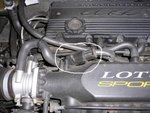Difference between revisions of "Idle Air Control Valve"
| Line 7: | Line 7: | ||
S1 K-Series engined Elises use a Rover IACV (Part No. MLZ100090) | S1 K-Series engined Elises use a Rover IACV (Part No. MLZ100090) | ||
| + | |||
| + | http://wiki.seloc.org/images/d/d8/IACV.jpg | ||
[[Image:IACV.jpg|thumb|none|150px|Idle Air Control Valve (K-Series)]] | [[Image:IACV.jpg|thumb|none|150px|Idle Air Control Valve (K-Series)]] | ||
Revision as of 13:12, 18 June 2006
Idle Air Control Valve
The IACV allows the electronic control unit (ECU, a.k.a. MEMS) to regulate the airflow to the engine independently of the driver's throttle input.
When the engine is idling MEMS uses this control (in parallel with igntion timing modulation) to compensate for varying loads that the engine must overcome to maintain the desired idle speed (i.e. friction, electrical load, A/C compressor load etc)
The IACV is also used to control airflow during load changes between positive and negative torque to provide a throttle damping function to improve the driveability characteristics of the vehicle.
S1 K-Series engined Elises use a Rover IACV (Part No. MLZ100090)
http://wiki.seloc.org/images/d/d8/IACV.jpg
S2 K-Series engined Elises use a different IACV (Lotus Part No. A117E6069S)
http://wiki.seloc.org/images/c/cc/S2_K_Series_IACV.JPG
If you are suspiscious that your IACV may be stuck/jammed, you can test it by disconnecting and reconnececting the ECU temperature sender with the car ignition on (but not running). If it can move, you'll hear it chatter as it seeks to a new position when you unplug the sensor.
